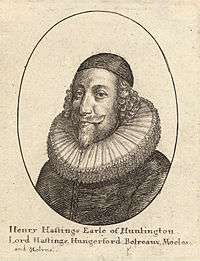Henry Hastings, 5th Earl of Huntingdon
Henry Hastings, 5th Earl of Huntingdon (24 April 1586 – 14 November 1643), was a prominent English nobleman and literary patron in England during the first half of the seventeenth century.

Life
He was born at Ashby-de-la-Zouch, Leicestershire, the one of three sons of Francis Hastings, Baron Hastings, and Lady Sarah Harington. Henry was a great-great-great-grandson of Margaret Pole, Countess of Salisbury.
Henry Hastings was educated at Gray's Inn. In 1595, Henry's father, Francis, died, and Hastings was next to succeed his grandfather, George Hastings, 4th Earl of Huntingdon, which on 31 December 1604, he did. In 1607, at the age of 21, Hastings commanded forces in the suppression of the Midland Revolt.[1] Throughout his maturity the 5th Earl served in a wide range of offices in the counties of Leicestershire, Lancashire, and Rutland, including Lord Lieutenant of Leicester and Rutland, 1614–42. He was also a member of the Virginia Company.
The Earls of Huntingdon were traditionally patrons of the town of Leicester and involved in its governance. However Huntingdon became involved in a law suit and in 1606 the town did not send him a customary New Year's gift. The Earl was offended, and in 1607 the townspeople sent his wife a gift of a horse to try to patch things up. The Earl, still offended, asked the Countess to refuse the horse, and the rift continued for a year.[2]
Marriage
On 15 January 1601 he married Lady Elizabeth Stanley (1588–1633), the third and youngest daughter of Ferdinando Stanley, 5th Earl of Derby, and Lady Alice Spencer. His wife was a great-great-granddaughter of Mary Tudor, Duchess of Suffolk. She, at one time, was third-in-line to succeed to the throne of England. However, she and her two older sisters were passed over for James VI of Scotland.
They maintained their country seat at Ashby-de-la-Zouch castle in Leicestershire and together had four children:[3][4]
- Lady Alice Hastings (1606–1667), married Sir Gervase Clifton, 1st Baronet; died childless.[4]
- Ferdinando Hastings, 6th Earl of Huntingdon (18 January 1608 – 13 February 1655), married Lucy Davies, by whom he had issue.[4]
- Lord Henry Hastings, 1st Baron Loughborough, of Loughborough (28 September 1610 – 10 January 1667), had issue.[4]
- Lady Elizabeth Hastings (born ca. 1605), married Sir Hugh Calverley; died childless.[4]
Patronage
Though a recognized leader of the Puritan movement and a critic of the policies of the House of Stuart, Hastings was also a patron of stage drama, comparable to his contemporaries the Earls of Pembroke—William Herbert, 3rd Earl, and Philip Herbert, 4th Earl. Hastings was known as the most important aristocratic patron of the playwrights Francis Beaumont and John Fletcher. (Hastings and Beaumont were distant cousins.) Hastings patronized other dramatists of the era as well, including John Marston.
Upon his death in 1643, Henry Hastings was succeeded by his eldest son, Ferdinando Hastings, as 6th Earl.
Notes
- McMullan, pp. 37-40.
- Courtney Erin Thomas, If I Lose Mine Honour I Lose Myself (Toronto, 2017), pp. 182-4.
- Collins, Arthur. The peerage of England, Volume 1 (Google eBook), page 60. The Peerage of England
- Lundy, Darryl, Charles Mosley, Burke's Peerage and Baronetage, 107th edition, volume 2, page 2005., retrieved 8 December 2010
Sources
- Doyle, James William Edmund. The Official Baronage of England. London, Longmans, Green, 1886.
- Finkelpearl, Philip J. Court and Country Politics in the Plays of Beaumont and Fletcher. Princeton, NJ, Princeton University Press, 1990.
- McMullan, Gordon. The Politics of Unease in the Plays of John Fletcher. Amherst, MA, University of Massachusetts Press, 1994.
Further reading
- Cogswell, Thomas. Home Divisions: Aristocracy, the State and Provincial Conflict. Manchester, Manchester University Press, 1998.
| Political offices | ||
|---|---|---|
| Vacant Title last held by The Earl of Huntingdon |
Lord Lieutenant of Leicestershire jointly with Lord Hastings 1638–1643 1607–1643 |
Succeeded by The Earl of Huntingdon (Royalist) |
| Preceded by Sir Henry Beaumont |
Custos Rotulorum of Leicestershire c.1607–1643 | |
| Preceded by The Lord Harington of Exton |
Lord Lieutenant of Rutland jointly with Lord Hastings 1638–1643 1614–1643 | |
| Peerage of England | ||
| Preceded by George Hastings |
Earl of Huntingdon 1604–1643 |
Succeeded by Ferdinando Hastings |
| Baron Hastings (descended by acceleration) 1604–1640 | ||